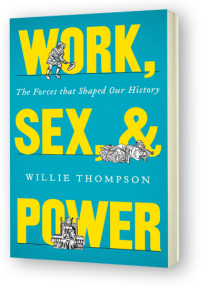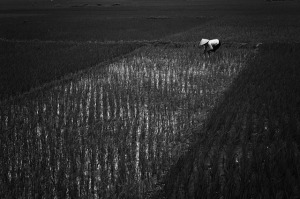Transcript
 The deep past extends its tentacles into the present and, in Work, Sex and Power Willie Thompson, until his retirement Professor of Contemporary History at Glasgow Caledonian University, demonstrates how this affects our species.
The deep past extends its tentacles into the present and, in Work, Sex and Power Willie Thompson, until his retirement Professor of Contemporary History at Glasgow Caledonian University, demonstrates how this affects our species.
He talks to Pod Academy’s Craig Barfooot about how, in recent years such approaches, covering lengthy stretches of time and continents, have taken on greater prominence, with terms like ‘Deep History’ and ‘Big History’ entering the vocabulary. This approach has been stimulated by a deepening awareness of the apocalyptic threat to humanity caused by runaway global warming and species destruction. The inability of the small-scope historiography favoured in previous decades to generate much illumination regarding this crisis has proven its limits.
Willie Thompson’s book is part of this new tendency but with a differing emphasis in important respects. It begins with argument on humans’ place in the universe and where they stand in the evolutionary process. It is concerned to emphasise both the continuity of humans with the animal kingdom and the wider biosphere, but also the categorical difference of their existence as social creatures equipped with language and, in their forelimbs, manipulative abilities possessed by no other creature. One early chapter discusses the evolution of conscious thought and the unique attribute of humans, in that through a developed form of consciousness they envisage their future selves, and their future projects, unlike any other species.
WORK
In this interview, Willie Thompson and Craig Barfoot explore the Palaeolithic era in which the original Homo sapiens lived their hunter-gatherer foraging lives in isolated family groupings and clan communities. This was a prehistoric period of human history, distinguished by the development of the most primitive stone tools and covers roughly 95%[1] of human technological prehistory.
The discussion then turns to the next ten thousand years following what is sometimes referred to as the ‘Neolithic Revolution’ which rapidly emerged over all the continents with the exception of Australia.
Crucially, it is notorious for ushering in the shift to production (via agriculture and herding) of animal and vegetable foodstuffs which replaced the earlier process of food acquisition ‘in the wild’. These techniques originated in what we now call the Middle East and also developed quite independently in different areas of the globe such as the Americas and China. The driving force was almost certainly climate change – as the glaciation of the latest ice age melted, humans experienced both environmental catastrophe, but also beneficial effects.
The consequences of this transformation for the societies involved were truly enormous and are still noticeable today. In the words of Jared Diamond,author of Guns, Germs, and Steel: A Short History of Everybody for the Last 13,000 Years ‘The hand of history’s course at 8000 B.C. lies heavily on us’.
The history since the Neolithic Revolution has been the history of forced labour, which has four structural forms varying in their details and frequently intermixed: exaction of tribute from producers; serfdom or bonded agricultural labour; outright slavery and wage labour. Debt emerged as a powerful mechanism used to force individuals into one or other of these forms of forced labour.
Work, Sex and Power explains how wage labour in the context of market economies became the prevalent form of economic compulsion thanks to the second great historical transformation: the creation of technologies that succeeded in unlocking the immense energies imprisoned in fossil fuels, a process that commenced around 300 years ago and proceeded to give us the world we now experience.
SEX
the history of civilisation has been the history of forced labour it has also been the history of misogyny. One gender has cruelly exploited the other, throughout all times and social categories – from the households of toilers to the harems of imperial dynasts. These forms of exploitation incorporate everything from making women serve as domestic drudges and the most brutally driven of field workers, to sexual slavery at all levels of society; as pawns in power games among elites; women’s subjection often accompanied by physical mutilation, genital or otherwise.
POWER
In hunter-gather society, the potential authoritarian power is intrinsically limited. But it is also true that when circumstances altered these primitive social structures, power blooms unceasingly – a process related to inherent potentials which were suppressed in earlier social formations and later promoted by the character of kin structures and economic differentiation between clans during the period of agrarian settlement. The default line of development for these societies has been the establishment of territorial empires ruled by god-kings, whether based on stone, bronze or iron technologies.
But power has also been resisted – resistance has occurred for millennia, including ancient Egypt. In the modern era there emerged large scale resistance to authoritarian power, and projects to replace it with more egalitarian societies.
Can the remarkable material and scientific advances of past decades be handled in such a way as to bring into existence a global social order based upon liberty, equality and fraternity? The sad reality is this an extremely difficult project in the face of irresponsible power (possibly even yet producing a nuclear cataclysm), religious bigotry and threatened environmental catastrophe and that the social muck of ten millennia cannot be cleared away in two or three centuries. Nevertheless, the objective remains a viable one and the project of averting environmental destruction can lead us towards other aims.
—————————————————–
Work, Sex and Power: The Forces that Shaped our History is available to buy from Pluto Press here.
Photos: Wonder where your cashmere comes from? and Working the Fields by DaiLuo
Tags: Deep history, Human history, Hunter gatherers, Neolithic era, Paleolithic era, Work, Work Sex and Power by Willie Thompson



Subscribe with…